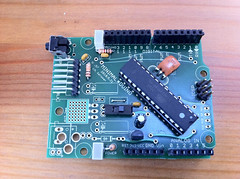Also new to the spreadsheet:
 Six boards by the Indian company Bhasha, all through-hole except for the FTDI USB chips, mostly simple designs but it's clear from the traces that the boards were reworked slightly. Interesting to see the "Severino" Single Sided Serial V3 design offered for sale, something I haven't seen elsewhere.
Six boards by the Indian company Bhasha, all through-hole except for the FTDI USB chips, mostly simple designs but it's clear from the traces that the boards were reworked slightly. Interesting to see the "Severino" Single Sided Serial V3 design offered for sale, something I haven't seen elsewhere.- Zigduino by Logos Electromechanical is offering their first run of IEEE 802.15.4 radio-equipped boards for $70. I've been looking forward to these boards coming out, but the price seems high given that you could buy an Arduino FIO for $25 and an XBee module for $19, so $44 total, or a Freakduino Chibi for $33. I hope the high price is only for this first run and that it is lower when Logos goes into full scale production, but I also wonder if it's as easy to use as the widely available XBee modules for which there are many example sketches available. It does have XBee "Pro" capabilities though, and I'm not familiar enough with 802.15.4 to really compare it to other offerings. I look forward to more complete documentation on its specs along with full design files since it's unclear what its equipment and capabilities are.





